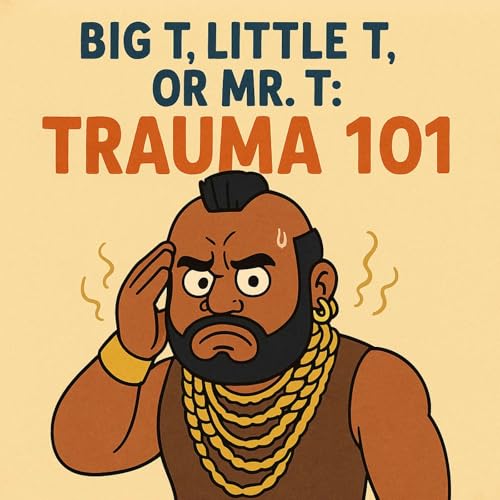
Ep.2 - Trauma 101: Big T, Little t, or Mr. T
カートのアイテムが多すぎます
ご購入は五十タイトルがカートに入っている場合のみです。
カートに追加できませんでした。
しばらく経ってから再度お試しください。
ウィッシュリストに追加できませんでした。
しばらく経ってから再度お試しください。
ほしい物リストの削除に失敗しました。
しばらく経ってから再度お試しください。
ポッドキャストのフォローに失敗しました
ポッドキャストのフォロー解除に失敗しました
-
ナレーター:
-
著者:
このコンテンツについて
Episode 2: Trauma 101 – Big T, Little t, or Mr. T
To reach out to us, please email us at jimdouglasgregory@gmail.com. Please include WW&TW in the subject line.
Podcast: Wounds, Wisdom & The Word
Hosts: Doug & Jamie
Introduction
- Episode 2 opens with gratitude for the unexpected support and feedback from listeners after Episode 1.
- Title playfully references “Big T, little t, or Mr. T” to frame a discussion on trauma and its impact.
Defining Trauma
- Clinical definition: A deeply distressing or disturbing experience with lasting psychological effects.
- Practical definition: The lasting emotional, mental, and sometimes physical impact of overwhelming or painful experiences—“too big to handle at the time.”
Types of Trauma
- Physical – Bodily injury or harm.
- Emotional – Includes witnessing traumatic events.
- Sexual – Assault or abuse.
- Developmental – Neglect or abuse during childhood.
- Complex – Repeated exposure to trauma.
- Moral – Witnessing or participating in unethical/harmful acts.
Trauma’s Effects
- Always changes worldview – reshaping how people see themselves and others.
- Loss of control is often central to traumatic experiences.
- Example: 9/11 created lasting trauma for both direct victims and distant witnesses.
Stigma & Faith
- Some families and faith communities dismiss trauma and mental health struggles.
- Proverbs 1:7 (ESV) – “The fear of the Lord is the beginning of knowledge; fools despise wisdom and instruction.”
- Therapy and science are not opposed to faith but uncover truths about God’s creation.
- Believers are encouraged not to ignore trauma or reject treatment.
Symptoms of Trauma
Physical: Chronic headaches, fatigue, back pain, appetite/sleep changes.
Emotional: Anxiety, depression, fear, guilt, shame, nightmares.
Cognitive: Trouble concentrating, memory issues, confusion.
Behavioral: Avoidance, hypervigilance, substance abuse, unhealthy coping.
Big T vs. little t
- Big T trauma: Sexual abuse, natural disasters, terrorism, war, severe medical events, sudden loss, neglect.
- little t trauma: Emotional neglect, perfectionism, people-pleasing, unhealthy relationships, bullying, parental pressure, infidelity.
- Trauma is relative: Impact depends on age, background, culture, and lived experience.
- Key insight: Trauma isn’t just what happened—it’s how it was processed and stored.
Trauma & the Brain
- Amygdala = alarm system.
- In trauma, the alarm gets “stuck on,” leading to hypervigilance and overreactions.
- Trauma alters brain chemistry, leaving people in constant fight-or-flight mode.
Coping & Addiction
- Many addictions (alcohol, drugs, food, porn, even Netflix) serve as numbing strategies.
- All activate the same dopamine/reward centers in the brain.
- Paul’s struggle in Romans 7:15–25 reflects the inner war between intention and harmful choices.
- The root problem isn’t always the addiction itself, but unresolved trauma beneath it.
Validation & Healing
- Traumatized individuals often lacked validation of their experiences.
- Validation means acknowledging pain while building resilience.
- Example: Responding to a bullied child with empathy and support, not dismissal.
Closing
- Doug shares his original poem “I Hate You Trauma”—an honest reflection on loss, grief, and hope in Christ.
- Reminder: Healing is possible, scars can bless others, and God provides strength and community.
- Teaser: Next episode will cover transgenerational trauma—“the gift that keeps on giving.”
Key Scriptures
- Proverbs 1:7
- Proverbs 23:9
- Proverbs 12:25
- Luke 21:34
- Romans 7:15–25
Takeaways
- Trauma is real, multifaceted, and affects everyone differently.
- It alters the brain and body, influencing choices and behaviors.
- Faith, therapy, and community are not at odds—together, they bring healing.
- Recognizing trauma is the first step toward reclaiming peace and purpose.
まだレビューはありません



